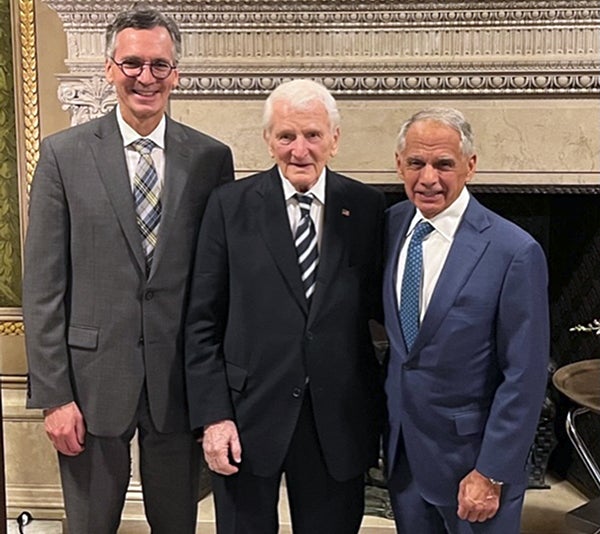Renown Doctors Will Help Fund Endowed Chair in Otolaryngology
Pittsburgh, November 15, 2021 – Joseph Maroon, MD, Heindl Scholar in Neuroscience at the University of Pittsburgh and Eugene Myers, MD, distinguished professor emeritus of otolaryngology and emeritus chair with the University of Pittsburgh Department of Otolaryngology, were honored as founders of skull base surgery at the University of Pittsburgh Medical Center at a special banquet October 29 at Pittsburgh's Carnegie Museum of Natural History.
In 1975, Dr. Myers was seeing a patient who had cancer originating in her hard palate and had endured 17 operations and two courses of radiation therapy. She complained of severe, unrelenting pain. Unfortunately, Dr. Myers’ exam revealed residual cancer in several areas. He recalled reading an article by Alfred Ketchum, MD, a well-known surgical oncologist at the National Institutes of Health, in which he described a new technique called the cranial facial approach. Dr. Myers felt he could do the transfacial portion of the surgery on this patient, but he needed to collaborate with a neurosurgeon who could do the cranial aspect
“I walked over to the office of Dr. Joseph Maroon, a newly minted neurosurgeon who I had known during his training and whose character, surgical skills, and judgment I admired,” Dr. Myers recalled.
Dr. Maroon was a bit surprised when Dr. Myers said he had a patient scheduled for this daring surgery, but he said "he was in." The surgery went well with no complications. The patient lived free of pain for a number of years. Based on their early success, Dr. Myers then led the efforts to establish a Center for Cranial Base Surgery at the University of Pittsburgh, the first of its kind in North America.
With the recruitment of additional faculty, Pittsburgh rapidly became the destination for such patients from the U.S. and abroad. The center is now led by co-directors Paul Gardner, MD, and Carl Snyderman, MD, who have performed thousands of operations using a less invasive technique called endoscopic endonasal approach (EEA), removing tumors from the base of the skull through the nose.

Refining these surgical techniques, conducting research in the pathophysiology of these tumors, and training the surgeons of tomorrow in these techniques takes considerable funding. To that end, Drs. Maroon and Myers are helping lead an effort to endow a chair in skull base surgery in the Department of Otolaryngology with Dr. Snyderman eventually serving as the chair holder.
Dr. Maroon and Myers are each making significant contributions and will help raise additional support to establish “Pioneers in Skull Base Surgery.” Dr. Myers said, “This would provide sustainability for this important endeavor." Upon completeion of funding—and when Dr. Maroon retires—the chair will be known as the Eugene N. Myers and Joseph C. Maroon Chair in Skull Base Surgery.
“Dr. Maroon and I are thrilled to lend our names to the establishment of the Eugene N. Myers and Joseph C. Maroon Chair in Skull Base Surgery,” Dr. Myers said. “It means a great deal to us that our pioneering efforts in establishing the University of Pittsburgh as the world’s center for this unique surgery are being recognized in this way.” Dr. Maroon said he’s doing this to honor Dr. Snyderman, who he called the consummate caregiver, physician, and surgeon, as well as one of the most creative minds in his specialty.
As for the recipient of this honor, Dr. Snyderman recognized Dr. Myers’ leadership and called him a mentor and role model. “With this chair, I hope to continue his legacy of surgical innovation,” he said.
